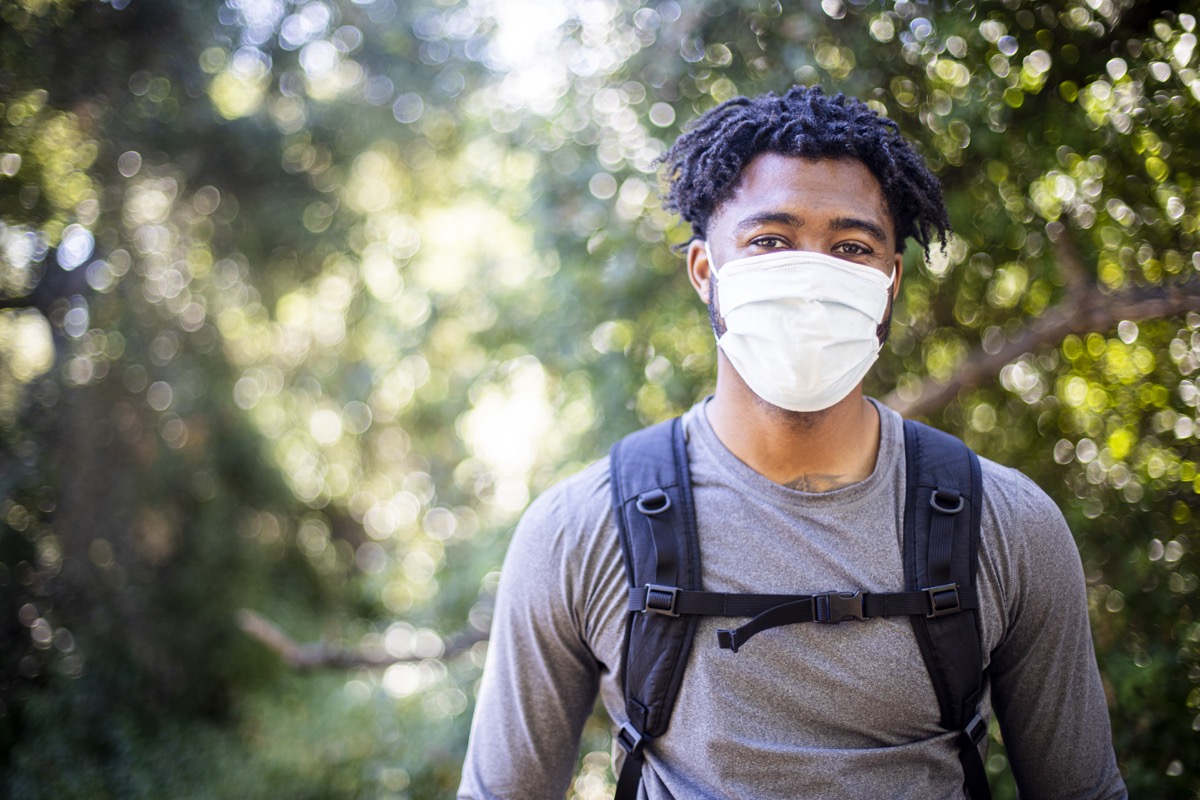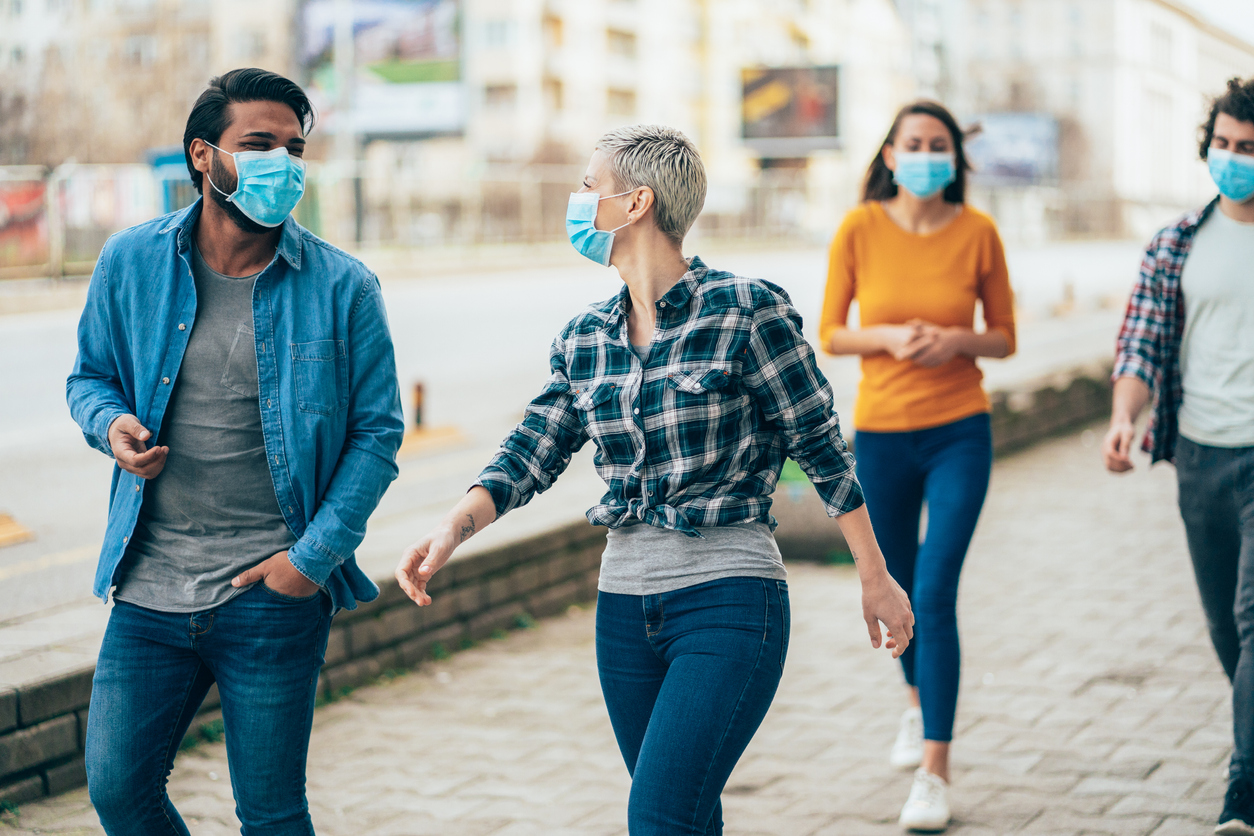The term “quarantine” is used for anyone who’s been in contact with an infected person, but is not confirmed to have COVID. For those people, the CDC has long recommended a 14-day quarantine. Since July, however, the CDC’s isolation guidelines, which are for those who test positive for COVID, have been that most people with COVID-19 can end isolation 10 days after they first show symptoms. However, that might be changing soon. Reuters reports an unnamed CDC official confirmed that the agency is considering reducing quarantine times on a press call. “Let me confirm that we are constantly reviewing the evidence and we are starting to have evidence that a shorter quarantine complemented by tests might be able to shorten that quarantine period from 14 days to shorter days,” the official said. The Wall Street Journal suggests that the new suggested quarantine period would most likely be between seven and 10 days in duration, and include a test being taken to prove that the person in question is negative. But the CDC hasn’t made anything official yet. “CDC is always reviewing its guidance and recommendations in the light of new understandings of the virus that causes COVID-19, and will announce such changes when appropriate,” a CDC spokesperson told NBC News. The current suggested 14-day quarantine is based on how long medical experts believe it can take for the virus to incubate in someone’s body. In October, NBC News points out, CDC Director Dr. Robert R. Redfield, MD, said researchers were looking to find out whether “you can use testing during the quarantine to determine if you can shorten the quarantine to seven or 10 days.” He added, “Obviously we don’t want people to be quarantined 14 days unnecessarily.” Reports suggest that one reason for reducing quarantine times is to encourage compliance, and help to reduce transmission. Henry Walke, the CDC’s incident manager for COVID-19 response, told the WSJ that studies have shown that quarantines can still work effectively when in place for less than 14 days. “Hopefully people would be better able to adhere to quarantine if it was, for example, seven to 10 days,” he said. Read on to find out if these new quarantine guidelines would keep you safe, and for more on where the situation with COVID is the worst, find out How Bad the COVID Outbreak Is in Your State. A new meta-analysis out of the University of St. Andrews, published in The Lancet Microbe journal on Nov. 19, examined 98 studies involving a total of nearly 8,000 patients who had been infected with one of three human coronaviruses that either cause COVID-19 (SARS-CoV-2), severe acute respiratory syndrome (SARS-CoV), or Middle East respiratory syndrome (MERS-CoV). Among the COVID-19 patients studied, the researchers found that viral load is highest five days after symptoms start, meaning that’s when the patient is most infectious. “Our findings are in line with contact tracing studies which suggest the majority of viral transmission events occur very early, and especially within the first five days after symptom onset, indicating the importance of self-isolation immediately after symptoms start,” lead author Muge Cevik, MD, a clinical lecturer in infectious diseases and medical virology at the University of St. Andrews, said in a statement. And for more ways to know if you’ve caught the virus, check out This Is the Easiest Way to Tell If You’ve Been Exposed to COVID.ae0fcc31ae342fd3a1346ebb1f342fcb “Those without symptoms may be as infectious as those with symptoms at the beginning of infection, but may be infectious for a shorter period,” Cevik explained. She noted that some of the studies they reviewed “suggest that asymptomatic individuals might clear the viral material from their bodies faster.” For more useful COVID content delivered straight to your inbox, sign up for our daily newsletter. The University of St. Andrews researchers said that in no COVID-19 study they examined were scientists able to detect “live virus beyond day nine of illness.” Though the virus could still be detected in patients’ respiratory or stool samples for weeks after a positive test, that means that patients are likely no longer infectious nine days after symptom onset. The researchers’ findings are in line with the CDC’s recommendations that anyone who has tested positive for COVID self-isolate for 10 days. “These findings suggest that in clinical practice, repeat PCR testing may not be needed to deem that a patient is no longer infectious, as this could remain positive for much longer and does not necessarily indicate they could pass on the virus to others,” Cevik explained. “In patients with non-severe symptoms, their period of infectiousness could instead be counted as 10 days from symptom onset.” And for more COVID advice, beware that If You Have This COVID Symptom, Don’t Go to Thanksgiving, Dr. Fauci Says. While that may leave you to believe a seven- or 10-day quarantine would suffice, it’s a bit more complex than that. A May study published in the Annals of Internal Medicine found, similar to the University of St. Andrews review, that the median incubation period for COVID-19 is estimated to be 5.1 days. But they also determined that 97.5 percent of patients who develop symptoms do so within 11.5 days of infection. “These estimates imply that, under conservative assumptions, 101 out of every 10 000 cases will develop symptoms after 14 days of active monitoring or quarantine,” the authors note. That means 10 days may not be enough quarantine time after potential exposure. “After 14 days, it is highly unlikely that further symptomatic infections would be undetected among high-risk persons,” the authors point out. However, “this method does not consider the role of asymptomatic infection.” A CDC report from July 10 estimated that 50 percent of coronavirus transmission occurs in the period of time when someone is pre-symptomatic, which is an added complication. And if you think you could be sick, read up on The 4 Easy-To-Miss Symptoms That Could Mean You Have COVID, Experts Say.



